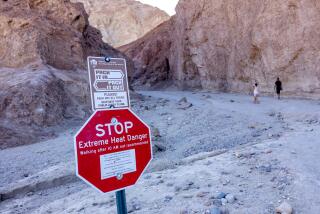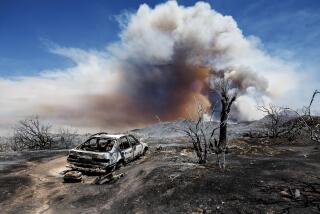Can somebody, please, help George Will understand climate?
George Will seems like a smart guy, so it’s a little mystifying why he cannot seem to understand the difference between weather and climate -- concepts that with a little education, the average third-grader could easily grasp. Could it be that he’s not trying?
In an appearance on ABC’s “This Week,” Will dismissed the notion that the heat wave plaguing the nation has anything to do with climate change. “How do we explain the heat? One word: summer,” Will said, asserting that current record-setting temperatures in the U.S. are nothing unusual.
“Come the winter there will be a cold snap, lots of snow, and the same guys, like [Washington Post columnist] E.J. [Dionne], will start lecturing us. There’s a difference between weather and climate. I agree with that. We’re having some hot weather. Get over it.”
Will would be almost right, if he weren’t willfully ignoring the evidence pointing to a changing climate. It is true that commentators on both sides of the political question about global warming tend to confuse weather with climate, with those who favor denying the problem pointing to cold winters as proof that it doesn’t exist, even as alarmists see hot summers as proof that Armageddon is nigh.
In a nutshell, the distinction is this: Weather is what’s happening outside your window right now, while climate is what’s happening in a wide geographic area over long stretches of time. If the only thing we had to go on was that the sidewalks in Washington, D.C., are hot enough to melt rubber soles, Will would be correct -- that’s just a nasty heat wave. Unfortunately, there’s much more to it than that.
The 12 months ending in June were the warmest, in terms of average nationwide temperatures, that the United States has experienced since record keeping began in 1895 (that’s a measure of climate, Mr. Will, not weather). In fact according to the National Oceanic and Atmospheric Administration, of the dozen warmest 12-month periods on record, all have occurred since 1999 (climate again).
Here’s where things get a little technical, but I suspect an Oxford-educated pundit like Will could understand it if he really applied himself. If you take the average U.S. temperature each month for the last 13 months and compare it with past average temperatures for that month, what you find is that each month has ranked in the top third of its historical distribution -- the first time that has happened in recorded history. In other words, June 2011 was in the top third of hottest Junes on record, as was July 2011, and August, and so on. According to NOAA, the odds of this occuring randomly are 1 in 1,594,323. Climate-change deniers such as Will are betting against very long odds, with the stakes being the quality of life of everyone on Earth.
Not that there is any amount of evidence that will convince ideologues who have already made up, and thoroughly closed, their minds, but it so happens that NOAA on Tuesday released a new State of the Climate report for 2011, a global evaluation performed annually by hundreds of climate scientists. And though the worldwide results don’t look as bad as those in the U.S. -- probably because climate last year was influenced by La Nina, the Pacific Ocean phenomenon that typically produces cooler worldwide temperatures -- they also don’t support Will’s conclusion that we should “get over it.” Arctic sea ice reached its second-lowest summer minimum extent in 2011 (the worst melt-off was in 2007). Globally, average temperatures were actually cooler in 2011 than in 2010, but 2011 was still among the 15 warmest years on record worldwide despite La Nina.
As I write this, it’s 97 degrees in the San Fernando Valley. That doesn’t mean Al Gore is right and George Will is wrong. It’s the mountain of temperature statistics that make Will wrong.
ALSO:
California’s way forward on water
Should freedom of the press shield WikiLeaks?
New tactic for Democratic candidates: stalking
Subscribe to Dan Turner on Facebook
More to Read
A cure for the common opinion
Get thought-provoking perspectives with our weekly newsletter.
You may occasionally receive promotional content from the Los Angeles Times.










